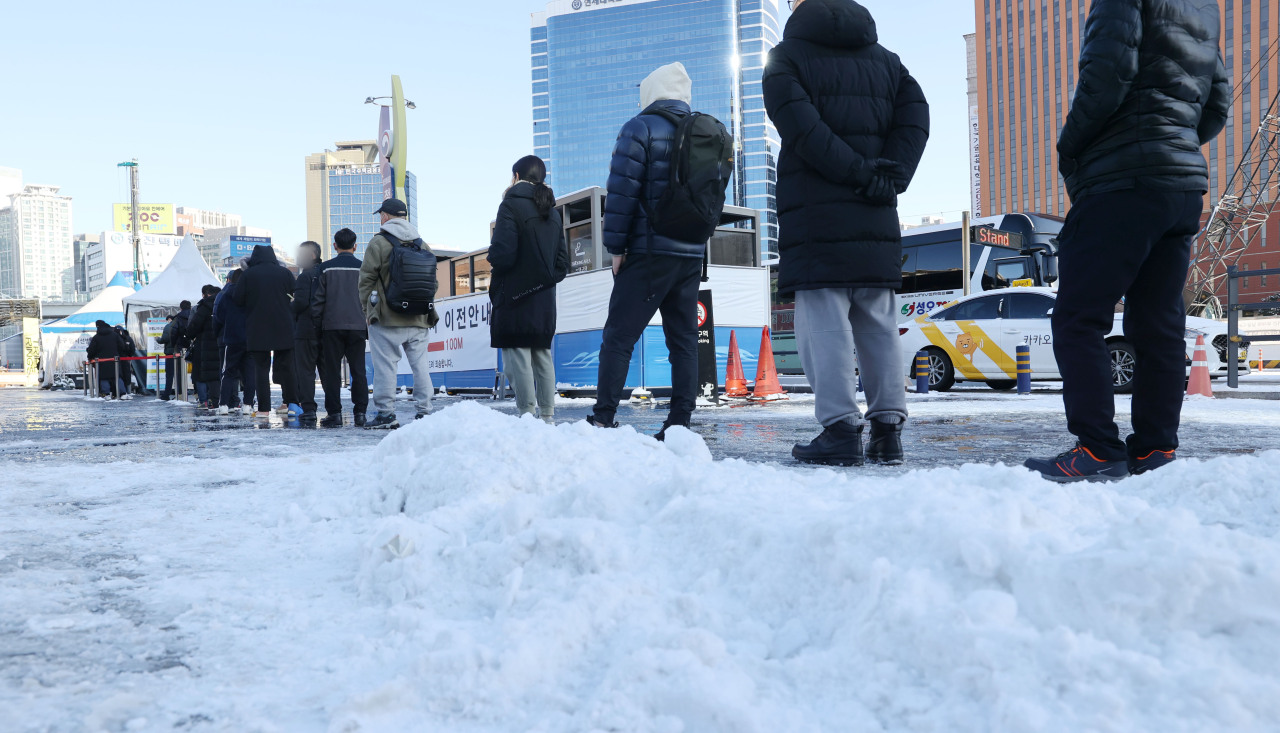 |
People wait in line to receive coronavirus tests at a temporary screening center at Seoul Station on Sunday, as the nation reported 6,236 daily COVID-19 cases. (Yonhap) |
South Korea's new coronavirus cases fell below 7,000 for the first time in five days Sunday, but critical cases surged to a record high as the government reimposed restrictions to contain the fast spread of the virus.
The country added 6,236 more COVID-19 cases, including 6,173 local infections, bringing the cumulative total to 565,098, the Korea Disease Control and Prevention Agency (KDCA) said.
Sunday's tally is slightly down from the previous day's 7,313 and the record high of 7,850 reported Wednesday.
The number of critically ill patients hit an all-time high of 1,025 on Sunday, after surpassing the grim milestone of 1,000 for the first time the previous day.
The country added 78 more deaths from COVID-19, bringing the total to 4,722. The fatality rate stood at 0.84 percent. The public health agency reported 12 more omicron variant cases, putting the total at 178.
On Saturday, the government reimposed a set of revised virus restrictions across the country, which will remain in effect until Jan. 2 to stem the spread of the virus.
It marks a reversal of the government's "living with COVID-19" scheme that began last month, with an aim to regain normalcy by relaxing virus restrictions in phased steps.
Under the updated measures, the maximum size of private gatherings is limited to four people nationwide, from the current limit of six in the capital area and eight elsewhere.
And a 9 p.m. or 10 p.m. curfew is applied to businesses, depending on their type of service.
Only fully vaccinated people are allowed to use restaurants and cafes with other people, while those who have not been vaccinated can only use the facilities alone or request takeout or delivery.
Schools in the greater Seoul area will resume remote learning and run at about two-thirds or 75 percent capacity beginning Monday, except for first and second grades in elementary school.
The extent to which masks can be worn and whether there is eating inside determine the degree of restriction. Up to 300 people can gather for outdoor sports events and other festivals approved by government agencies.
Of the locally transmitted cases, Seoul reported 2,308 infections and Gyeonggi Province that surrounds the capital logged 1,723 cases Sunday.
The KDCA said 63 cases came from overseas, raising the caseload to 16,329.
South Korea is grappling with a growing shortage of hospital beds reserved for critically ill patients, as well as medical workers and equipment.
The bed occupancy rate in intensive care units for COVID-19 patients stood at 87.6 percent in Seoul as of 5 p.m. on Saturday, and the figure for the country as a whole came to 79.1 percent.
The figure exceeds the 75 percent threshold, considered the saturation point. More than 31,000 COVID-19 patients are currently undergoing at-home treatment.
Only 279 beds in intensive care units are available for use across the country, according to authorities.
Meanwhile, a pregnant woman living in Yangju, north of Seoul, who was receiving at-home treatment for COVID-19 gave birth inside an ambulance after being rejected by 16 hospitals due bed shortages.
As of Sunday, 84.7 percent of the country's 52 million people had received their first shots of COVID-19 vaccines, and 81.9 percent had been fully vaccinated, while 22.5 percent had gotten booster shots, the KDCA said. (Yonhap)








